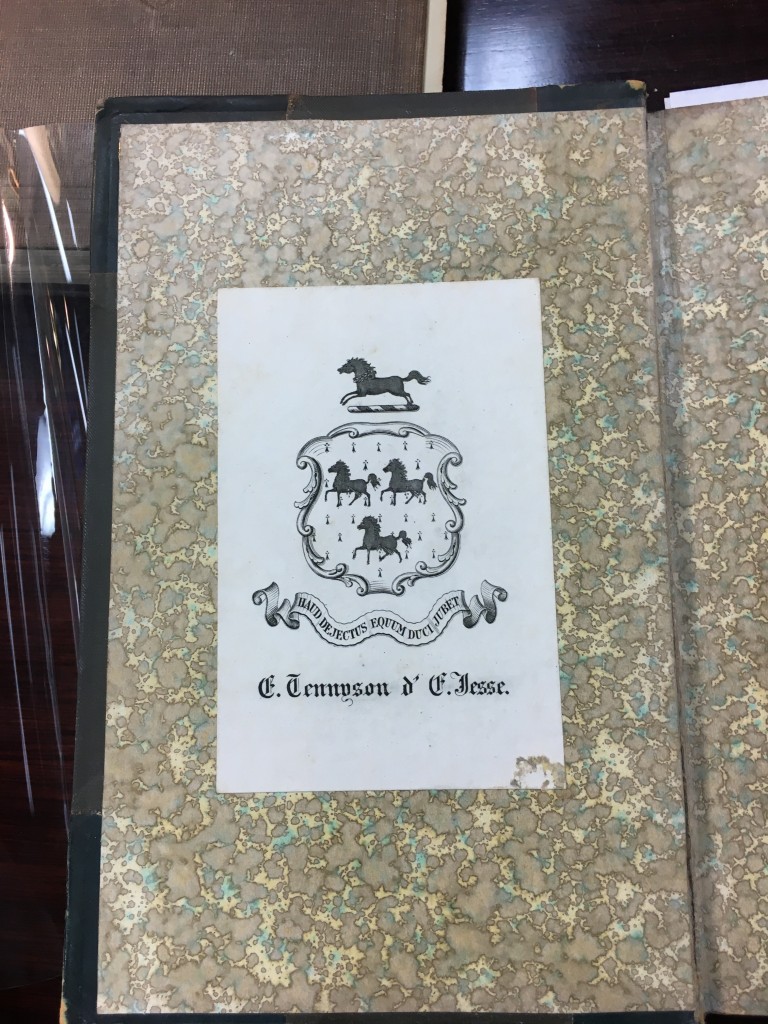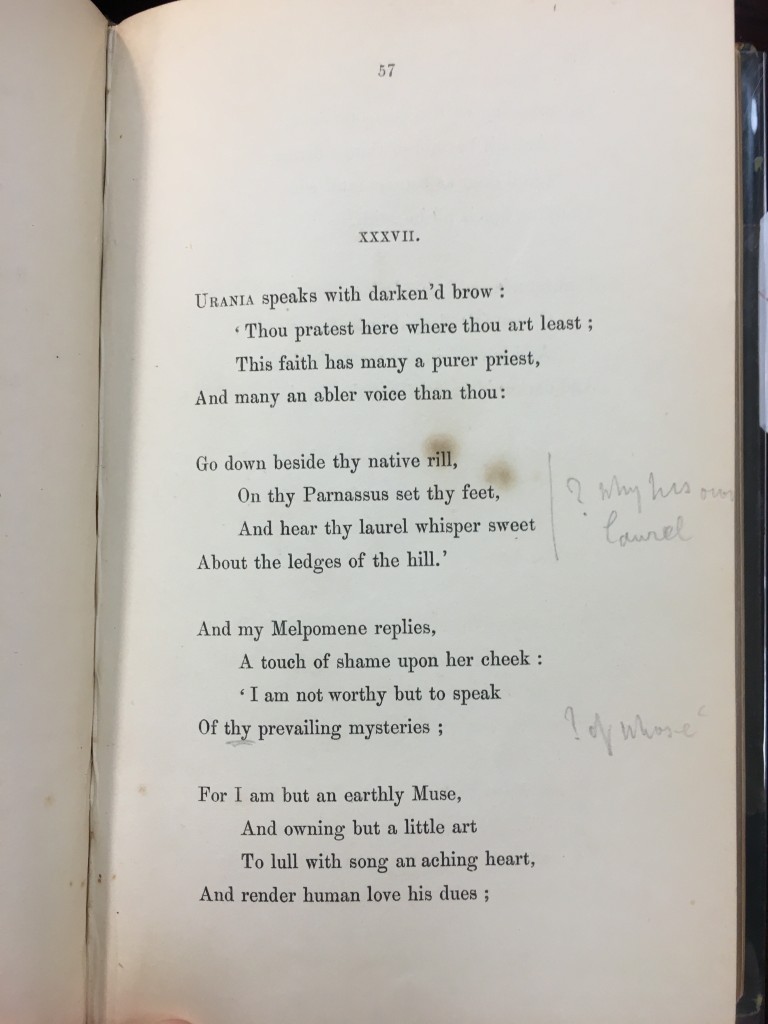Alfred Tennyson, In Memoriam. Third ed. London: Edward Moxon, 1850 with inscription and annotations. (ABLibrary Rare X 821.81 T312in 1850b)
Rare Item Analysis: Early Edition of In Memoriam owned by Emily Jesse (née Tennyson)
by Meg Wilder
The Armstrong Browning Library holds a unique item that teaches scholars the impact of Alfred Tennyson’s In Memoriam on his sister, Emily Jesse (née Tennyson). This item is located in Baylor University’s Armstrong Browning Library in the Rare Books Collection (ABLibrary Rare X 821.81 T312in 1850b). The rare book is the third edition of the poem, and it was published in 1850. Unfortunately, the document is not accessible electronically at the moment, but hopefully the Armstrong Browning scholars will digitize this vital document. Emily’s son, Eustace Tennyson d’Enycourt Jesse sold the edition after his mother’s death, and the rare book includes several notes, including the dedication to Arthur Hallam: “A.H.H. i.e. Arthur Henry Hallam, son of Hallam the historian, engaged to my Mother Emily Jesse, née Tennyson.” This rare book embodies an immense amount of historical and literary information, but I found several marginal pencil notations most intriguing in their indication of confusion about the poetry.
Although I am not a handwriting expert, the document clearly encompasses multiple handwritings. Emily mourned the death of her fiancé and brother’s best friend, Arthur Henry Hallam, for years, and Tennyson spent seventeen years perfecting In Memoriam. Surely this book owned by Emily meant a great deal to her. The volume of poetry is greatly preserved, but obviously well used. Most pages include pencil markings and annotations. The inscriptions by Eustace do not match the annotations throughout the book, so I conclude that Emily Jesse (née Tennyson) annotated her copy of In Memoriam during her lifetime. For brevity’s sake, I will confidently assume that the writer of these annotations is Emily henceforth. It is also important to note that the book includes the Jesse family seal and Eustace refers to his mother with her married last name. Despite the fact that Emily remarried, she still held this poem about her first love to a high importance.
I found the annotations on page 57 fascinating. Emily annotates XXXVII of Tennyson’s In Memoriam. This section of the poem references the muse of heavenly poetry, Urania and the goddess of elegiac poetry, Melpomene. Melpomene replies, “A touch of shame upon her cheek:/‘I am not worthy but to speak/Of thy prevailing mysteries.” The annotation in the margins states, “? Of whose.” At first, I found this odd; obviously, the surface meaning of “thy” refers to Urania. Melpomene speaks these words, praising Urania. At first, I meddled with the idea that Emily might have been unfamiliar with the Greek mythology to which her brother refers. This theory soon dissipated. If Emily were seriously confused with the content of the poem, wouldn’t she have just asked her brother? She was his favorite sister, so I believe that if she were confused about any surface meaning of the poem, she would have asked her brother.
I presented my findings on this volume in class along with the question: why was Emily puzzled by Tennyson’s “thy?” The direct meaning of “thy” is Urania who is not only the classical muse of astronomy, but also the muse of heavenly poetry. In the previous poem, XXXVI, Tennyson discusses the Christian revelation. Here, in poem XXXVII, Urania rebukes the speaker as unfit for the task of Christian revelation. While reading this section, Emily could be momentarily confused, and rightly so. Throughout the poem, Tennyson represents Hallam as spiritually superior to himself, so it would not be abnormal for Tennyson to speak in this way about Hallam. If read in this way, Tennyson feels that he is “not worthy” of Hallam’s “prevailing mysteries,” which was probably true. Although Emily’s reading is technically wrong, this reading reveals something Tennyson might have unconsciously embedded in his poem. Tennyson and Emily both deeply loved and respected Hallam, and through Emily’s annotations, readers can gain a better understanding of Tennyson’s admiration for Hallam.
Reading Emily’s annotations helps bring this reading forward. Emily and Tennyson spent years mourning the death of their beloved friend, and although they might have not openly discussed their grieving in their correspondence, this rare book depicts that connection. In the future, I hope to see this document become digitized so that scholars will be able to debate the writer of every annotation in the rare item. I am looking forward to that debate, and if a scholar counters my argument and claims that Emily Jesse (née Tennyson) did not write the notes, I will respond that my argument still holds validity. Even if Emily is not the author of these notes, we do know that she owned this volume for her entire life and we can safely assume that she read the poem many times. Even if she was not confused by the phrase “of thy,” my argument that the book shows Emily and Alfred’s grieving process remains true.
 |
 |
 |
 |
